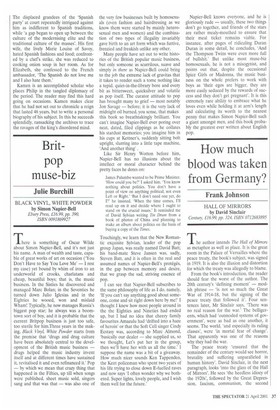Brit
pop muse-biz
Julie Burchill
BLACK VINYL, WHITE POWDER by Simon Napier-Bell Ebuty Press, 116.99, pp. 390, ISBN 0091869927 here is something of Oscar Wilde about Simon Napier-Bell, and it's not just his name. A man of wealth and taste, capable of great works of art on occasion (`You Don't Have to Say You Love Me' — I rest my case) yet bound by whim of iron to an underworld of crooks, charlatans and cheap, beautiful boys; that is, the music business. In the Sixties he discovered and managed Marc Bolan; in the Seventies he turned down Julio Iglesias and in the Eighties he wooed, won and mislaid Wham! Typically, he now manages Russia's biggest pop star; he always was a boomtown sort of boy, and it is probable that the current Britpop business is just too safe, too sterile for him.Three years in the making, Black Vinyl, White Powder starts from the premise that 'drugs and drug culture have been absolutely central to the development of the British music business — drugs helped the music industry invent itself and at different times have sustained it, revitalised it and even refinanced it.' Pop — by which we mean that crazy thing that happened in the Fifties, up till when songs were published, sheet music sold, singers sang and that was that — was also one of
the very few businesses built by homosexuals (even fashion and hairdressing as we know them were started by mainly heterosexual men and women) and the combination of two types of illegality invariably gave birth to an art form which was furtive, frenzied and freakish unlike any other.
Many people have set out to write histories of the British popular music business, but only someone as scurrilous, suave and simply in there as Napier-Bell could bring to the job the extreme lack of gravitas that it takes to render such a tome nothing like a tepid, quiet-in-the-library bore and every bit as bittersweet, quicksilver and volatile as pop itself. The curator attitude to pop has brought many to grief — most notably Jon Savage — before; it is the very lack of midnight oil burned, you sense, that makes this book so breathtakingly brilliant. You can't imagine Napier-Bell ever poring over neat, dated, filed clippings as he collates his stardust memories; you imagine him in his cups at Kettner's, suddenly sitting bolt upright, slurring into a little tape machine, `And another thing'.
Like Sir Henry Wotton before him, Napier-Bell has no illusions about the intellect or moral character behind the pretty faces he dotes on:
James Palumbo wanted to be Prime Minister. 'How could you be?' I asked him. 'You know nothing about politics. You don't have a point of view on anything political, not even Left or Right.' But I don't need one yet, do I?' he insisted. When the time comes, I'll read up on it and decide where I ought to stand on the crucial issues.' It reminded me of David Sylvian writing Tin Drum from a book of photos of China and planning to make an album about politics on the basis of buying a copy of the Times.
Touchingly, we learn that the New Romantic exquisite Sylvian, leader of the pop group Japan, was really named David Batt; his band-mate Steve Jansen was, sadly, Steven Batt, and it is often in the real and assumed names of Napier-Bell's proteges, in the gap between memory and desire, that we grasp the sad, striving essence of pop,
I can see that Napier-Bell subscribes to the same philosophy of life as I do, namely, 'If you can't say anything good about someone, come and sit right down here by me!' I thought I knew how most people around in the the Eighties and Nineties had ended up, but I had no idea that cheery family favourites Amazulu had 'drifted into a haze of heroin' or that the Soft Cell singer Cindy Ecstasy was, according to Marc Almond, 'basically our dealer — she supplied us, so we thought, Let's put her in the group, then we'll have her with us all the time.' I suppose the name was a bit of a giveaway. How much nicer sounds Ken Tappenden, the Kent policeman who spent two years of his life trying to close down E-fuelled raves and now says 'I often wonder why we bothered. Super lights, lovely people, and I wish them well for the future.'
Napier-Bell knows everyone, and he is gloriously rude — usually, these two things don't go together, and friends of the stars are rather mealy-mouthed to ensure that their meal ticket remains viable. For instance, after pages of ridiculing Duran Duran in some detail, he concludes, 'And the Thompson Twins were even more full of bullshit.' But unlike most muse-biz homosexuals, he is not a misogynist, and points out that, despite the occasional Spice Girls or Madonna, the music business on the whole prefers to work with boys as 'their egos are bigger, they are more easily seduced by the rewards of success and they don't get pregnant'. It is this extremely rare ability to embrace what he loves even while holding it at arm's length and calculating its worth to the nearest penny that makes Simon Napier-Bell such a giant amongst men, and this book probably the greatest ever written about English pop.


































































 Previous page
Previous page